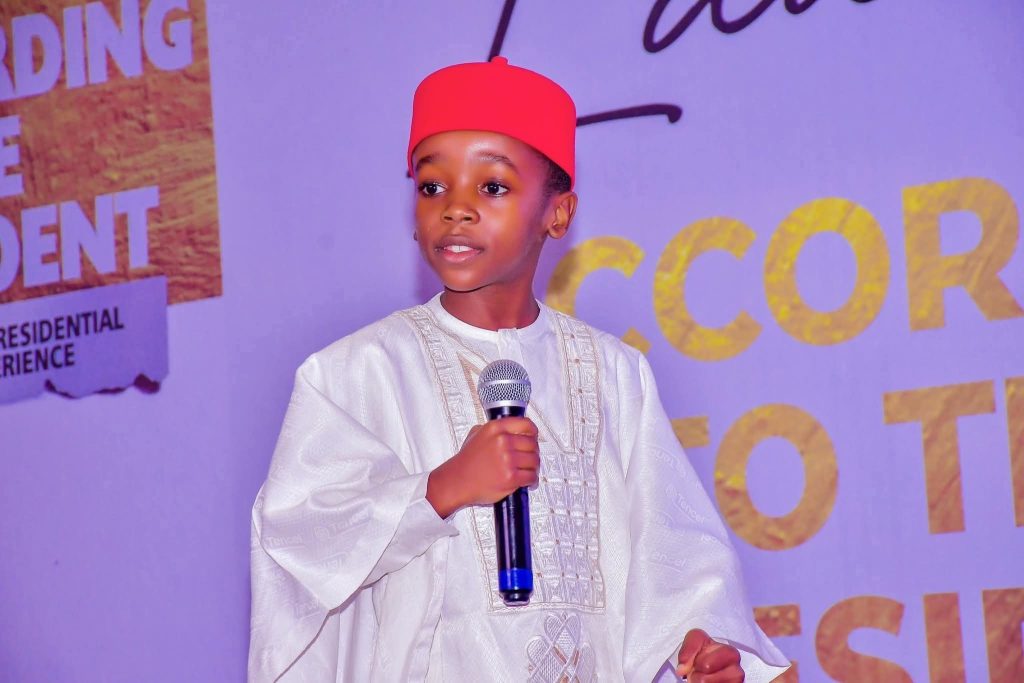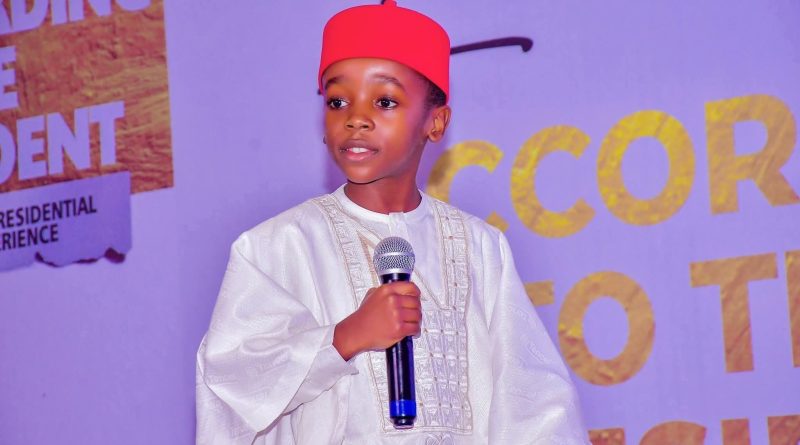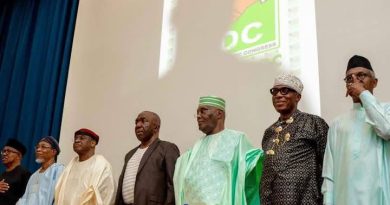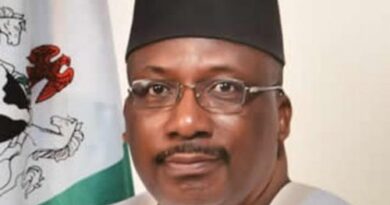A Young Buhari’s Poetic Tribute To A Leader-By Yushau A. Shuaib
“The young Buhari’s voice may have echoed through a room of Nigeria’s political elite, but its real impact lies beyond the event. It speaks to the power of parenting, storytelling, and belief”

At the recent public presentation of the book “According to the President” by Mallam Garba Shehu, former presidential spokesperson, precisely on July 9, 2025, a moment of unexpected eloquence and emotion stole the spotlight. Amidst a sea of statesmen and dignitaries — including former Head of State General Yakubu Gowon, former Vice Presidents Atiku Abubakar and Yemi Osinbajo, and a host of ministers and public figures — a young boy, no older than nine, confidently approached the podium. Clad in a flowing white babanriga, he moved with the grace of royalty and the command of a seasoned orator.
With the calm precision of someone far beyond his years, he adjusted the microphone, glanced at the press cameras, and began his speech: “I am the Buhari in us, not just the man, but the meaning. He was a lion, not in his robe, but in his restraints. He walked like a whisper through a marketplace of noise, unshaken by apples, unburned by insults. He wore power like plain clothes, no embroidery, no excess, only weight.”
The hall fell silent. All eyes locked on the boy, mouths agape, stunned by the weight of his words and the measured cadence of his voice. He spoke not just with eloquence, but with the conviction of one who believed deeply in what he said.
He portrayed former President Muhammadu Buhari as a quiet but resolute leader — a man of integrity, discipline, and restraint, who chose national interest over personal gain. His poetic tribute painted a portrait of a leader rarely seen in Nigeria’s often loud political landscape.
What struck me most was not merely the child’s elegance, stage presence, or mastery of language — though all were impressive — but the legacy he clearly inherited. This young boy, named after Muhammadu Buhari himself, is the son of Haruna Abdullahi, popularly known as Haruspice — a name familiar to many in Nigeria’s political communication circles.
For more than a decade, I have known Haruspice as a passionate and unwavering supporter of Buhari. Remarkably, his devotion wasn’t born of appointment, patronage, or political favour. He held no official position under Buhari’s administration, yet he defended him with a fervour that sometimes even made close associates like myself slightly uncomfortable — particularly when the President’s decisions merited public scrutiny.
Haruspice responded to criticism of Bihari with articulate, persuasive counter-narratives, grounded in loyalty and genuine conviction. His dedication culminated in the publication of “The Buhari in Us”, a book that presented Buhari as a symbol, a spirit, and a philosophy of governance grounded in simplicity, discipline, and service.
As someone who has also admired Buhari from my university days — even penning an article titled “In Defence of Buhari” as far back as 1990 — I approached Haruspice’s book with both interest and critical scrutiny. I eventually published a reflective review titled “Image Repair Theory on The Buhari in Us”, in which I analysed the book through the lens of the Image Repair Theory (IRT), a crisis communication framework often employed in public relations to defend reputations under threat.
Haruspice’s work, I noted, masterfully employed IRT strategies such as denial, evasion of responsibility, reduction of offensiveness, and corrective action. His literary flair and persuasive rhetoric were undeniable. But I also pointed out inconsistencies and selective narrations that often accompany such deeply personal, emotionally charged tributes. I warned that while the book was a powerful defence of Buhari, it sometimes crossed into hagiography — blurring the lines between fact and reverence.
Nonetheless, Haruspice never wavered in his passion. It is, therefore, no surprise that he groomed his son in the same school of thought, instilling in him the values, charm, and eloquence that marked his own public engagements.
Just days after the book launch came the shocking news of President Buhari’s passing. Since then, both father and son have continued to pay emotional tributes across various platforms. Their social media pages have become digital archives of praise — filled with videos, prayers, and reflections honouring the late leader.
In one especially touching video posted shortly after Buhari’s death, the young boy appeared visibly heartbroken, yet composed. He spoke in English, interspersed with Arabic verses:“Inna lillahi wa inna ilayhi raji’un… My heart is sullen and heavy over the loss of my hero, President Muhammadu Buhari… Oh Allah, rest his soul and grant him Aljannatul Firdaus…”
The boy’s tribute was not just moving — it encapsulated a lineage of loyalty and respect passed down from father to son. In a society where political allegiances often shift with the winds of fortune, the constancy of Haruspice and his young son’s admiration for Buhari is a poignant reminder that leadership, regardless of its complexities, can inspire enduring reverence.
President Muhammadu Buhari was a man who sparked admiration and provoked criticism in equal measure. His legacy, like that of many leaders, is layered with achievements, missed opportunities, controversies, and convictions. Yet, in the eyes of some — like Haruspice and his son — he remains a symbol of quiet strength, national service, and moral restraint.
The young Buhari’s voice may have echoed through a room of Nigeria’s political elite, but its real impact lies beyond the event. It speaks to the power of parenting, storytelling, and belief. Whether or not one agrees with the poetic depiction of Buhari’s legacy, one cannot deny the emotional sincerity and intellectual clarity with which it was delivered.
In that child’s voice, one heard not just a tribute to a leader, but a call for a nation to remember — and perhaps rediscover — the values of discipline, patriotism, and restraint. In an age of noisy leadership, the whisper of Muhammadu Buhari junior (Jnr) rang loud and true.
Yushau A. Shuaib is the author of “An Encounter with the Spymaster”
Email: yashuaib@yashuaib.com




